How Much Water to Drink With Creatine?
Author:
Unlock your full potential by engaging with our experts and community! Have questions about your fitness journey or looking for expert advice on weightlifting techniques? Don’t hesitate — leave a comment below and Oleksandr Maksymenko will provide a personalized answer and insights to help you reach your goals.
Torokhtiy is reader-supported. Some links are affiliate links, and we may earn a commission at no extra cost to you. See our disclosure page for details.
Unlike many other supplements, creatine is backed by science research, so it’s no wonder so many people use it. Regardless of if someone is just starting to use it or if they’ve been using it for a while, chances are a lot of people don’t exactly know how much water to drink with creatine.
Creatine is great at retaining water, and it’s the first thing people learn about it. This is, in fact, one of the reasons why it’s so popular – muscles can temporarily get bigger and stronger from it.
So, Do I need to drink more water when taking creatine? This is a fair and common question if you are thinking of using (or already are) using it. The answer is – yes, but don’t go overboard with it. Let us elaborate on this further in more detail!
How much water to drink with creatine? Add an extra 8 ounces of water for each 3-5 grams of creatine, listen to your body, and adjust your water intake if needed. The amount can vary based on factors like your body size, activity level, and overall hydration needs.

Why Is Hydration So Important?
Do you remember being in biology class at school and seeing that picture of the percentage of water in the human body, where the water comes almost up to your shoulders? It’s true – the human body is mostly made of water.
Not that people are walking cucumbers, but the importance of water intake cannot be overstated and it’s a lot more than just quenching your thirst. It influences everything – from feelings and emotions to bodily functions and it’s the cornerstone of well-being.
But the role water has goes far beyond just keeping people alive. It helps with digestion, circulation, regulates temperature, and the transportation of nutrients and waste products.
When physical activity is concerned, water is even more important than you think, and it influences your performance. Dehydration is dangerous and can lead to a lot of issues if it’s not taken care of. When working out, the body loses a lot of water through sweat. If it’s not replenished, the coordination and cognitive functions are really going to suffer.
Now, there is something called overhydration, and that can be harmful. It means that there’s more fluid than the body needs and now it’s struggling with it. It can lead to nausea and headache, and sometimes even seizures.
There are a lot of people out there who up their fluid intake too much because they think it’s necessary if they’re using creatine. But too much of anything is never good.
How Much Water to Drink With Creatine?
There’s a delicate balance between taking in too much water and not taking enough of it. Both will have (negative) consequences, and neither will have benefits. Creatine and water go hand in hand so it’s essential to understand their relationship.
Creatine is a natural substance that’s found in food like red meat and fish, and it can also be produced by our bodies in limited quantities. The thing is. People cannot get as much as they would want of it from food because it’s there in small amounts.
This is where creatine supplements come into play to effectively saturate muscles and enhance athletic performance.
When it comes to energy production, creatine is very important, especially when it comes to short bursts of intense activity. Its most important function is to increase the body’s phosphocreatine stores. This will then help replenish adenosine triphosphate (ATP), which is the energy currency of cells.
What does all of this mean? Basically, it means that creatine can improve performance where there are quick bursts of energy needed (weightlifting, sprinting, jumping, etc.).
Before starting to take it, it’s vital to understand creatine’s relationship with water. Creatine can enhance muscle cell volume by drawing water directly into the cells (this is called cell volumization). Simply put – this process can temporarily make the muscles bigger and stronger.
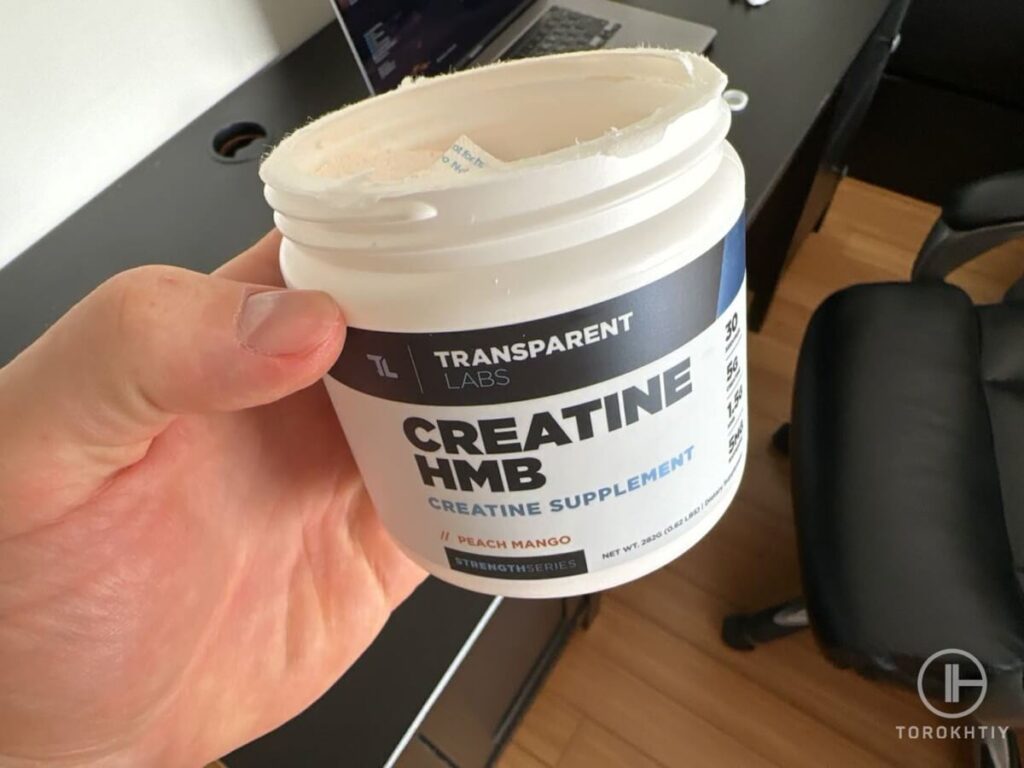
So, what happens when you don’t drink enough water with creatine? If there’s not enough water, not only is the creatine not going to be effective, but the overall performance will suffer. The body temperature will rise, the blood flow to the muscles will be decreased, the heart rate will go up and eventually, there will be a decline in strength.
So, do you need to drink more water when you take creatine? And the correct answer is: it depends!
If you’re using a creatine loading scheme (e.g. 20 grams of creatine per day, 5 to 7 days. Then switch to 3-5 grams a day for maintenance), it’s likely that a little extra fluid will be necessary. Especially if you have not been drinking enough water before and are dehydrated or training in the heat.
But this doesn’t mean you need to drink a gallon of water more. Anywhere from an additional 8 to 16 ounces of water will be fine for most. The most important thing is to listen to the body’s signals and be wary of any signs of dehydration.
If you’re taking creatine without loading (3-5 grams a day) and are used to drinking enough fluids without symptoms of dehydration, the extra water requirements may be so low that you don’t need to change anything in your regimen, the risk of dehydration due to creatine, in this case, tends to zero.
How Much Liquid Do You Need per Day During Creatine Supplementation?
There is some general information regarding the amount of liquid to take daily when taking creatine and that can be very helpful. Is a gallon of water enough for creatine? This is a very common question, but there is some more specific information here.
Before going into details, there’s one really important thing to understand – there’s no specific amount that will work for everyone. Misinformed people are often scared of it and think it will dehydrate them, make them bloaty, etc.
But creatine isn’t what dehydrates the body. It’s not some water-sucking substance you take that leaves people feeling like prunes. Studies have reported that creatine loading promoted short-term fluid retention averaging about 0.5-1.0 L, which is proportional to the observed weight gain.
But this gain does not occur overnight; it occurs over the course of 10-14 days of creatine supplementation. Thus, the daily water requirement for most people increases by no more than 50-100 ml!
For very large athletes with significant muscle mass, the figure may increase slightly because their muscles can store more water. However, even in this case nothing extraordinary happens. There’s no need for any drastic changes in water intake to prevent dehydration while taking creatine – just a little bit more than usual.

How much water should you drink a day on creatine? It’s good to remember that hydration is a dynamic process, so it’s going to vary. Someone may need more today than they will tomorrow. That’s why it’s important for everyone to listen to what their body is telling them and decide what amount is ideal.
It’s best to look out for signs of dehydration. First and most importantly, if you feel thirsty, drink water! Also, a simple and reliable way is to pay attention to the color of the urine.
If your urine is completely clear and does not have a yellow tint, you are probably drinking more than the required amount of water. This should be avoided because excess water dilutes the electrolyte content of the body.
Urine that is a light straw color, like light beer, means you are sufficiently hydrated. Darker-colored urine means you need to increase your fluid intake.
While the urine color test provides good information about a person’s hydration levels, it is worth noting that the color of urine could be darker or lighter due to other factors — not only because of dehydration (e.g. diet, medication, medical condition, infection, concentrated urine, overhydration, usage of diuretics, excessive caffeine or alcohol consumption).
Therefore, you should avoid symptoms of severe dehydration, such as dry mouth and tongue, dry eyes, dizziness, headache, and if anything is there, it’s good to have a glass of water or even more.
Can we draw our own color chart?
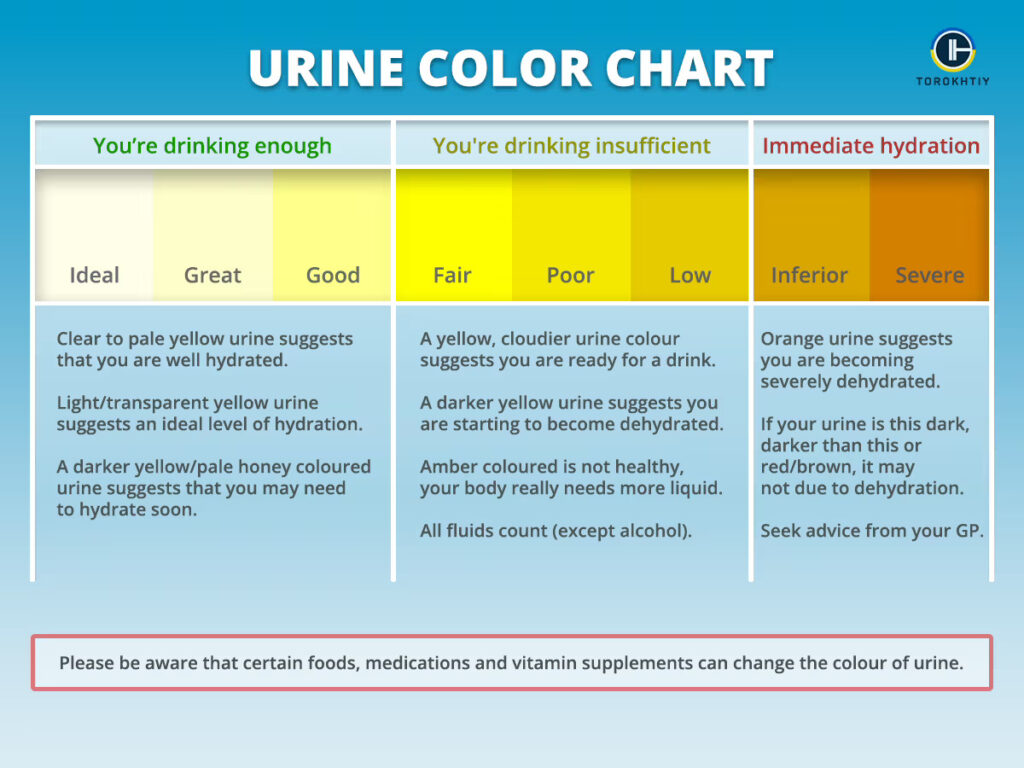
6 Dehydration and Other Creatine-Related Myths
Creatine is a scientifically researched, safe supplement. The reason there are so many myths surrounding it is because people do not do their research before using it, or they’re using creatine incorrectly. With so many people having access to all kinds of different platforms, debunking myths has become a necessity to separate facts from fiction.
1. Creatine Causes Dehydration
The most common one – creatine, will dehydrate the body. As we have written above, there is a reason for this myth: creatine actually retains a certain amount of water in the muscles.
However, the problem is clearly overestimated; daily water requirements increase only slightly and this is unlikely to lead to dehydration in most cases. In addition, water requirements only increase during the first few weeks of creatine use, after which they return to approximately normal.
2. Creatine Worsens Thermoregulation
There’s a myth saying that, because of water retention, the body won’t be able to cool itself down as effectively as it would without taking creatine. But there are no scientific studies that confirm this.
Staying hydrated while working out is super important regardless of whether you are taking creatine or not, and creatine itself does not have any direct effect on the body’s ability to regulate temperature.

3. Creatine is Harmful to the Kidneys
This is a really concerning one because anything that poses any kind of danger to the kidneys should be avoided at all costs. Creatine, however, won’t harm the kidneys. The myth comes from the belief that excess creatine will strain the kidneys, but, again, no research confirms that.
Even in higher doses, there’s no relation between creatine and kidney strain. The body will process creatine and remove it through urine, without causing any harm to the kidneys in the process.
creatine dosage calculator
Loading Phase:
Maintenance Phase:
4. Creatine Will Make You Gain Weight
Many people think that, because creatine is so good at water retention, they’re going to end up bloated and with more weight than they started out with. But the truth is, the extra water is contained in the muscle cells themselves, so the weight gain or bloating they may be worried about is absolutely minimal.
There may be a slight increase in weight because of the extra water in the muscles, but this is not the same as gaining body fat. In fact, since creatine can cause the muscles to grow, it can have a positive impact on people’s weight goals over time.
5. Creatine Is an Anabolic Steroid
Another completely untrue statement. Creatine is not a performance-enhancing drug. There’s a huge difference between creatine, which is a supplement, and anabolic steroids, which are drugs. Creatine is a natural substance found in food and it enhances energy production, without any hormonal effects that steroids have.
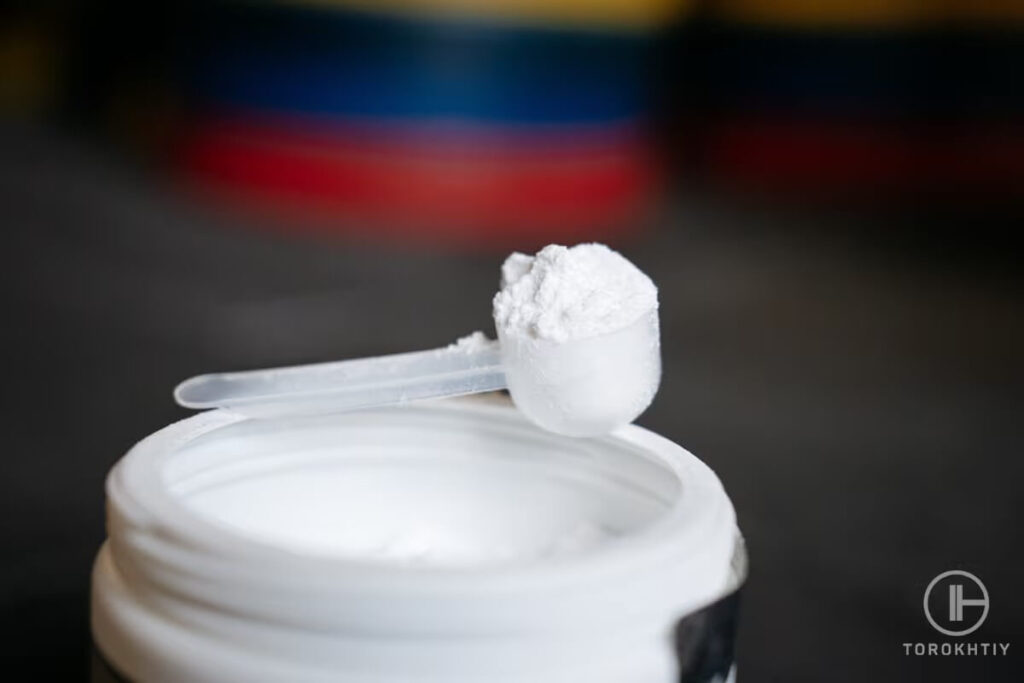
6. Creatine Is Only for Bodybuilders
This is a common misconception. The advantages of creatine aren’t limited to the realm of bodybuilding. While creatine is often used for muscle growth (not hypertrophy, but instead cellular volumization/hydration), its benefit is much broader.
Creatine aids in energy production, as well as is being studied for potential cognitive benefits, or as an effective dietary strategy to combat age-related muscle atrophy and sarcopenia.
Creatine Supplement We Recommend
Transparent Labs CREATINE HMB
- Form: Powder
- Servings per Container: 60
- Type: Creatine Monohydrate
- Suitable for Vegans: Yes
- Other Ingredients: HMB, Vitamin D, BioPerine
- Price per Serving (5g): $0.75 (Note: Serving size is 10g)
- Company Founded: 2012
- Recommended by Athletes: Hafthor Bjornsson, Paul Sklar, Sean Harris
Generally speaking, supplements should always be bought only from trusted brands. Luckily, Transparent Labs is one of them. They are Informed Choice Certified and dedicated to transparency. The formulas are based on scientific research, and they are also very clean – exactly what you would want a supplement to be.
Speaking of ingredients, let’s address that clean formula. That’s not an overstatement, because this one really is clean – no artificial sweeteners, additives, or any of that.
Now, the taste is not as good as someone would think (with it being called blue raspberry and all), but it’s better to have the taste suffer a bit instead of taking something that tastes like candy and has just as much sugar.
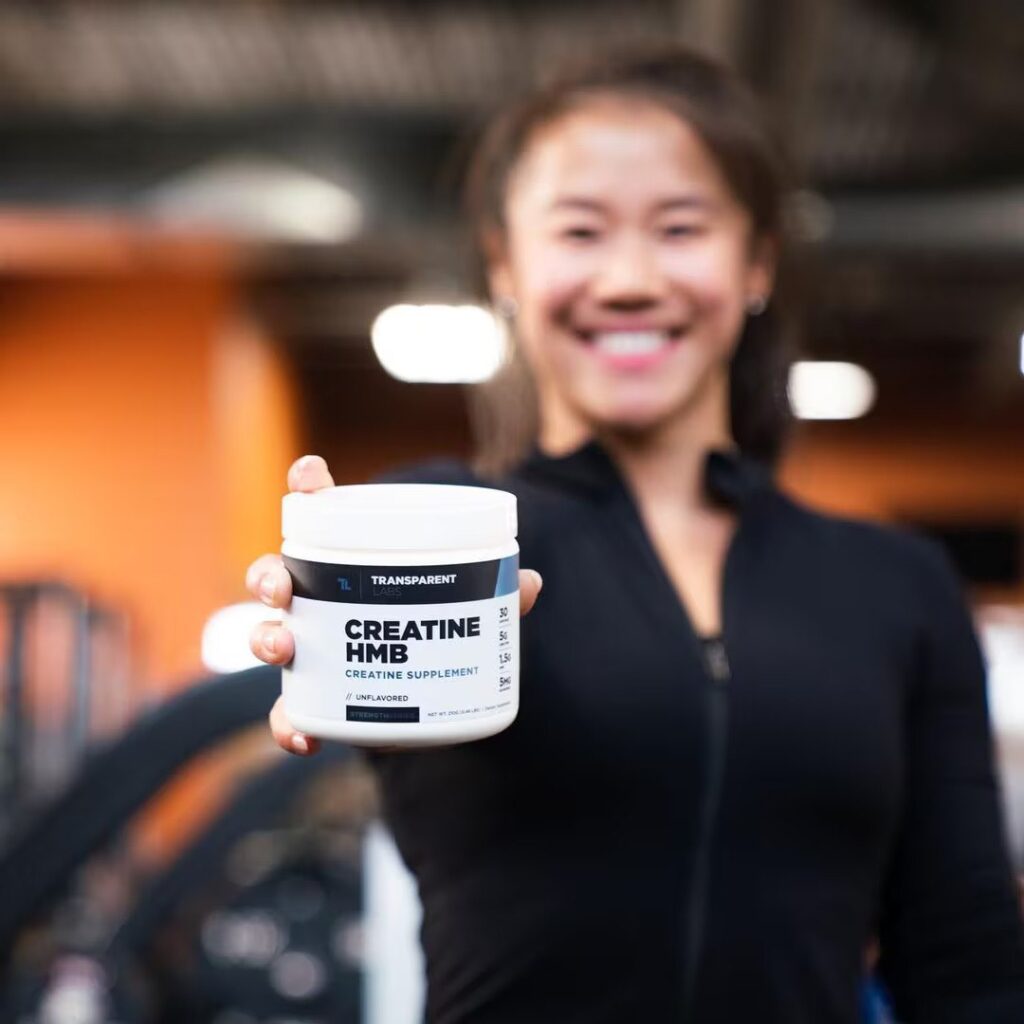
Speaking of formula, this product contains approximately 1500 milligrams of HMB (β-Hydroxy β-Methylbutyrate). HMB is known for its muscle-protective benefits during intense training. It can reduce muscle protein breakdown, boost recovery, and support muscle growth. Adding HMB to creatine creates a beneficial synergic mixture.
It also contains 5mg of Bio Perine, which is a patented extract obtained from black pepper fruits (Piper nigrum). It contains at least 95% piperine. Piperine has been shown to increase absorption of various nutrients (amino acids, vitamins, minerals), by affecting the gastrointestinal tract.
Piperine hasn’t been extensively studied to increase creatine absorption, but given how piperine is shown to increase nutrient bioavailability, it is plausible that piperine could have a positive effect on creatine absorption speed.
Positives:
Could be better:
FAQ
Should I Drink a Lot of Water With Creatine?
“A lot” can mean different things for different people. Anywhere from 8 to 16 ounces more than normal is ideal when taking creatine, but it’s important to look for signs of dehydration (pale yellow urine means there is enough water in the body, while dark urine is a sign of dehydration).
How Much Water Do I Mix With 5 Grams of Creatine?
“How much water should I mix with creatine?” is an important question to ask to make sure you’re getting the ratio right. How much water for 5 grams of creatine depends on the preferred texture, but anything from 6 to 8 ounces of water is fine.
How to Properly Take Creatine?
The best way to use creatine is 3-5 grams per day over a long period of time. If for some reason a faster saturation of creatine is required, a loading scheme can be used, where 15-20 g of creatine is divided into 4-5 portions and taken in the first weeks, and then a maintenance dose of 3-5 g per day is used.
Conclusion
When it comes to creatine water intake, we’ve covered all there is to cover! You now know what creatine is, how it works and what it can do for you. You can even educate some misinformed scaredy cats that think creatine is a drug that will ruin your body and inflate you like a balloon.
What are your thoughts on the topic, and do you take creatine? What’s the water-to-creatine ratio you’ve found that works best for you? Do you have a favorite brand? What results have you noticed from creatine and why did you start taking it? All opinions and comments are welcome here!
Also read:
- Can You Mix Creatine With Pre Workout
- Does Creatine Help With Fat Loss
- Micronized Creatine vs Monohydrate
- Is Creatine Safe for Teens
- Creatine Hydrochloride vs Monohydrate
- Does Creatine Make You Gain Weight
- Should You Take Creatine Before or After a Workout
- How Long Does Creatine Take To Work
- What Happens When Creatine Expires
- Does Creatine Cause Bloating
References:
- E S Rawson, P M Clarkson, T B Price, M P Miles, “Differential response of muscle phosphocreatine to creatine supplementation in young and old subjects” National Library of Medicine, https://pubmed.ncbi.nlm.nih.gov/11851597/ (accessed Jan, 2002), 174(1):57-65.
- Steven L Nissen, Rick L Sharp, “Effect of dietary supplements on lean mass and strength gains with resistance exercise: a meta-analysis” National Library of Medicine, https://pubmed.ncbi.nlm.nih.gov/12433852/ (accessed Feb, 2003), 94(2):651-9.
- Matthew B Cooke, Emma Rybalka, Andrew D Williams, Paul J Cribb & Alan Hayes, “Creatine supplementation enhances muscle force recovery after eccentrically-induced muscle damage in healthy individuals” Journal of the International Society of Sports Nutrition, http://surl.li/kxjyq (accessed June 02, 2009).
- R Aaserud 1, P Gramvik, S R Olsen, J Jensen, “Creatine supplementation delays onset of fatigue during repeated bouts of sprint running” National Library of Medicine, https://pubmed.ncbi.nlm.nih.gov/9809381/ (accessed Oct, 1998), 8(5 Pt 1):247-51.
- Richard B. Kreider, Douglas S. Kalman, Jose Antonio, Tim N. Ziegenfuss, Robert Wildman, Rick Collins, Darren G. Candow, Susan M. Kleiner, Anthony L. Almada & Hector L. Lopez , “International Society of Sports Nutrition position stand: safety and efficacy of creatine supplementation in exercise, sport, and medicine” Journal of the International Society of Sports Nutrition, http://surl.li/kupzy (accessed June 13, 2017).
- Photos are made by Torokhtiy Media team.
Why Trust Us?
With over 20 years in Olympic weightlifting, strength training, nutrition coaching, and general fitness our team does its best to provide the audience with ultimate support and meet the needs and requirements of advanced athletes and professional lifters, as well as people who strive to open new opportunities and develop their physical capabilities with us.
By trusting the recommendations of our certified experts in coaching, nutrition, and sports training programming, as well as scientific consultants, and physiotherapists, we provide you with thorough, well-considered, and scientifically proven content. All the information given in the articles concerning workout programming, separate exercises, and athletic performance, in general, is based on verified data.
The product testing process is described in more detail here.
Author: Oleksandr Maksymenko
Certified Sports Nutritionist,
MSc Sports Dietetics
Specializing in: Weight management, Fitness / Sports nutrition
Oleksandr is a professional fitness nutritionist certified by the Fitness Professional Association (FPA). He follows the principles of evidence-based dietetics and fosters a healthy relationship with food in his clients, ensuring there are no strict prohibitions on their favorite foods or frequent lapses. His primary goal is not only to achieve results for you but also to sustain them over the long term, all while enjoying tasty and delicious food.



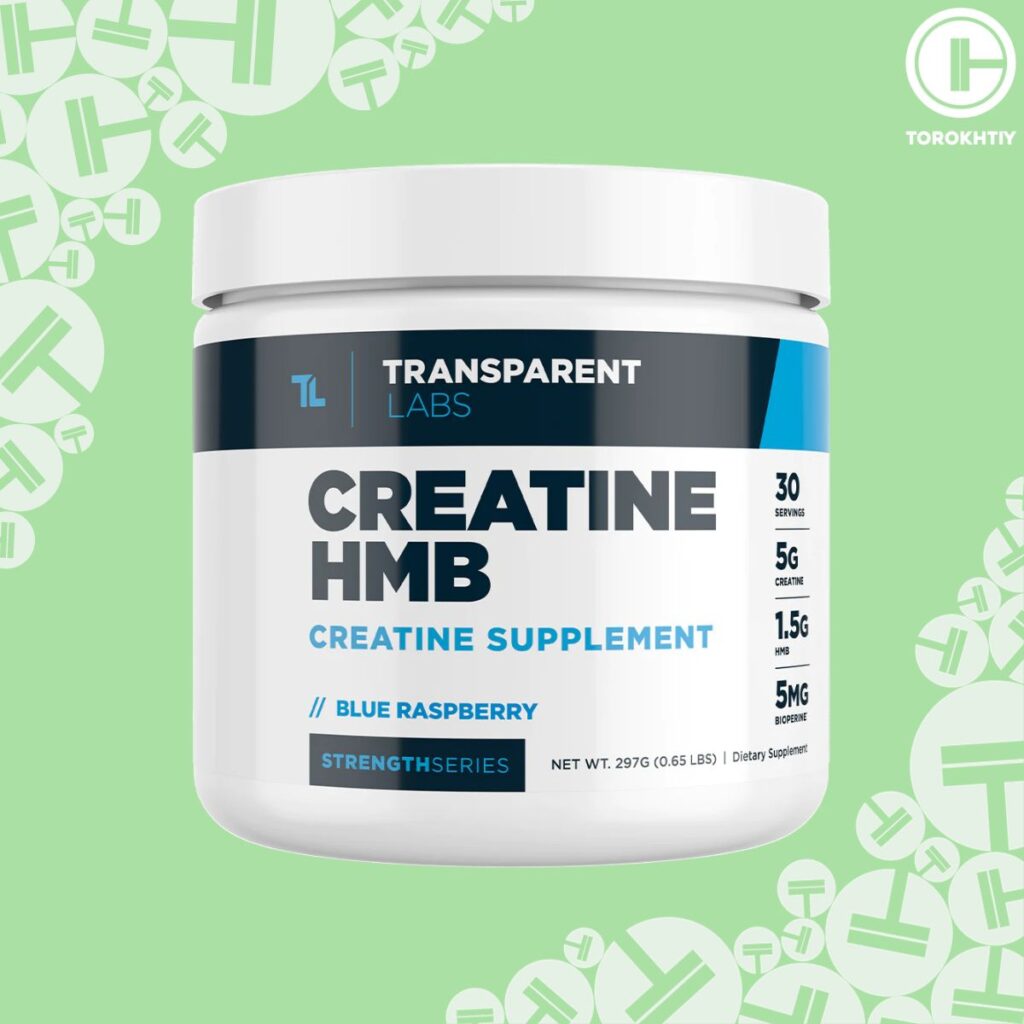
Still have questions after reading our article? Unlock your full potential by engaging with our experts and community! Don’t hesitate — leave a comment below and Oleksandr Maksymenko will provide a personalized answer and insights to help you reach your goals.